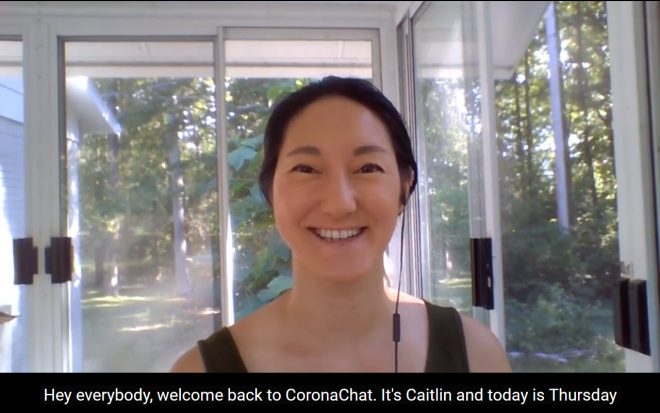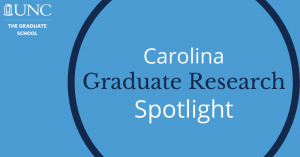Carolina’s global leadership in research relies on the collaborative work of faculty and graduate students. Close to 30% of the total enrollment at UNC-Chapel Hill, graduate students make research contributions in many academic fields — from medicine to musicology and beyond. In an ongoing series, The Graduate School is featuring content, in a variety of forms, highlighting graduate student work in advancing discovery.

When COVID-19 information became both abundant and inconsistent earlier this year, Caitlin Williams started receiving questions from friends and family who were trying to understand the pandemic. Williams is a doctoral student in maternal and child health in the Gillings School of Global Public Health and a member of The Graduate School’s Royster Society of Fellows. Her work in public health positioned her as a resource in the minds of her loved ones.
Williams’s husband (a Ph.D.-trained immunologist) suggested that she record some videos and make them available to her friends and family. Williams started producing two videos a day (one in English, one in Spanish) and has recently scaled back to one video a week. The series, known as CoronaChat, is accessible via YouTube, Facebook and Instagram.
Collaboration is key to the project: Williams works alongside Shara Evans, a doctoral student in maternal and child health; Natalie Smith, a doctoral student in health policy and management; and Williams’s sister, Ellie Williams, who is a former television reporter and provides her professional experience to help with the production of content.
Though it certainly makes for more work for the team, producing bilingual content on this topic is particularly important to them. “In conversation with friends and colleagues, I realized there was a real gap in Spanish-language information on coronavirus, putting Latinx communities at heightened risk,” says Williams. “That has since changed in some states, but there’s still a real dearth of information in North Carolina and across the South in Spanish.”
Although Williams originally thought of her new COVID-19 research effort as separate from her typical research, she says that, in retrospect, it all ties together. Williams works, often internationally, around the implementation of policies and practices to improve sexual and reproductive health. In March, this work became more complex: She says, “With the pandemic, we had to figure out how to continue data collection and keep projects going while keeping people safe, while not putting people at additional risk.”
Understanding the risks to these populations was only part of the challenge. Additional complications arose as non-essential health care services were forced to shut down or severely scale back. “Sexual and reproductive health care services are necessary and they can’t wait,” says Williams, “but many of them were being shut down anyway.”
Williams, who earned her bachelor’s and master’s degrees at UNC-Chapel Hill, says the collaborative research environment at Carolina is one of the primary reasons she’s chosen to pursue her studies here. “There’s this incredible collegiality,” says Williams. “I’ve been lucky to be mentored by a number of different people, and to collaborate with a number of different people. And that’s been a really exciting thing over the course of my time in the program.”
Williams’s adviser, Herbert Peterson, the William R. Kenan Jr. Distinguished Professor in maternal and child health and obstetrics and gynecology, speaks on his collaborative experiences with Williams, highlighting her capabilities as a researcher and advocate. “Caitlin is mission-driven and, in addition to her hard work and dedication, brings great passion and a strong sense of social justice to her pursuits in global health. She also fully recognizes the vital importance of successful collaborations in research – and has already established herself as a key contributor to that success in her work with us at Gillings.”
 Williams’s public health background and research experiences within maternal and child health gave her the skills to be a resource to her community during a time of global uncertainty. And lessons learned from CoronaChat will influence her research moving forward. For Williams, this project has emphasized the importance of making scientific information accessible for everyone: “The whole purpose of doing this, the whole purpose of the research enterprise, is to generate knowledge that benefits humanity. And so, if we’re not communicating what we’re finding with people beyond our immediate scientific community, we’ve kind of missed the point, right?”
Williams’s public health background and research experiences within maternal and child health gave her the skills to be a resource to her community during a time of global uncertainty. And lessons learned from CoronaChat will influence her research moving forward. For Williams, this project has emphasized the importance of making scientific information accessible for everyone: “The whole purpose of doing this, the whole purpose of the research enterprise, is to generate knowledge that benefits humanity. And so, if we’re not communicating what we’re finding with people beyond our immediate scientific community, we’ve kind of missed the point, right?”
Read more about CoronaChat in this Gillings School of Global Public Health story: Maternal and Child Health Doctoral Students Address COVID-19 Misconceptions in Bilingual Video Series.
—By Sydney Nicolla, Roy H. Park Doctoral Fellow in the UNC Hussman School of Journalism and Media
